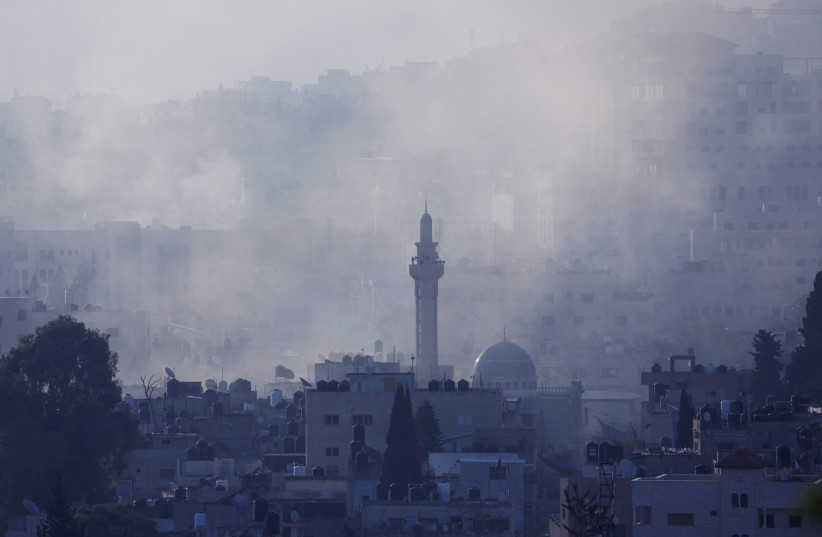Why doesn’t the major IDF raid on Jenin have a name?
Israel launched its largest military action in Jenin in two decades overnight Sunday, but in contrast with its efforts to root out terrorism in Gaza, the current action is not being called an “operation,” nor has the IDF given it a name.
That lack of a name is meant to signal that this raid is narrow, focused, and intended to be short.
“This is not an operation. It’s not semantics; I’m not saying that for no reason,” a senior Israeli diplomatic source said, calling it a “brigade-level raid.”
Foreign Minister Eli Cohen characterized the IDF’s actions as a “large-scale effort to thwart terrorist activity in Jenin,” in remarks at an event to launch his ministry’s participation in the next UN climate change conference.
An operation usually takes many days and even weeks, while this is meant to be “very focused on targets in Jenin found by our intelligence,” the source stated.
 Smoke rises during an Israeli military operation in Jenin, in the West Bank July 3, 2023. (credit: REUTERS/MOHAMAD TOROKMAN)
Smoke rises during an Israeli military operation in Jenin, in the West Bank July 3, 2023. (credit: REUTERS/MOHAMAD TOROKMAN)The IDF raid on Jenin “won’t be too long, but we don’t know if things will get complicated. We didn’t commit to a certain timeline, but it’s not an operation; it’s a few days of battle,” he said.”
Cohen emphasized that Israel is “operating in a targeted manner” and “making a conscious effort to prevent harm to the local civilian population.”
“There will not be any safe havens for terrorism,” Cohen said “The Jenin camp has become a center for terrorist activity. It shelters those responsible for carrying out terror attacks against both the civilian population and security forces.”
Largest raid in Jenin since the Second Intifada
The IDF launched its largest raid on Jenin since the Second Intifada early Monday, with airstrikes and infantry in the northern Samaria city. The Palestinian Authority lost security control of Jenin over the past six months, and the city turned into a launching pad for many recent terrorist attacks.
The diplomatic source argued that Israel put off the action for two years, but it became necessary: “We tried to avoid it and made an effort to stop the terrorist cells when they got out of the [Jenin refugee] camp. We hoped the Palestinian Authority would take responsibility, but they didn’t.”
In addition to terrorists themselves, the central target of the raid is infrastructure, including sites in which Palestinians attempted to manufacture rockets and other explosives.
The source cited the Palestinians’ “unacceptable” bombing of a Panther Command and Liaison Vehicle two weeks ago, using an improvised explosive device that is more advanced than what had been seen in the past in the West Bank. In addition, he said that there have been several attempts at launching rockets from Jenin, which failed, “but we know that’s how it starts.”
Prime Minister Benjamin Netanyahu approved the operation without convening the Security Cabinet. However, he held a situation assessment meeting with the heads of Israel’s security branches on Sunday evening about terrorism in the West Bank and the Palestinian Authority‘s increasing precariousness.
Cohen instructed all Israeli embassies to contact decision-makers to present Israel’s messages about the IDF raid on Jenin.
The IDF, Foreign Ministry and embassies abroad coordinated messaging as the operation was launched overnight Sunday, with tweets of maps of Jenin showing terrorists’ operational sites, including storehouses for weapons and explosives, next to schools and UNRWA facilities, and videos of terrorists raising their guns in the middle of populated areas.
“Over the past two years, Jenin has become a major hub of terrorism and an Iranian stronghold close to Israeli population centers. Most of the terror attacks against Israelis originated from Jenin,” the Foreign Ministry tweeted.
Ambassador to the US Michael Herzog tweeted the same text, adding: “No nation would sit idly by as terrorists strike its citizens.”





Comments are closed.